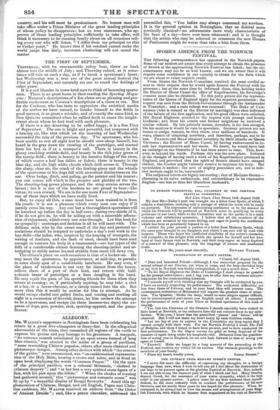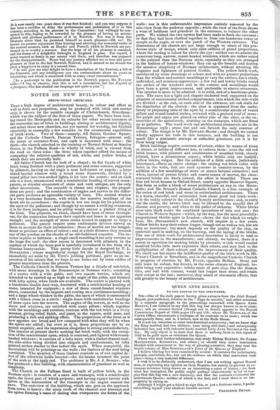SPOHR'S. ABSENCE FROM THE NORWICH FESTIVAL.
THE following correspondence has appeared in the Norwich papers. Some of our readers are aware that every attempt.to obtain the presence of SPOHR at the approaching Norwich Festival has failed ; but the cir- cumstances may not be so well known, and we are aware that it will require some confidence in our veracity to obtain for the facts which we are about to relate implicit credit.
From SPOHR the Norwich Committee received the most cordial as-
sent to their request that he would again honour the Festival with his presence ; but at the same time he informed them, that, holding under the Elector of Hesse Cassel the office of Kapellmeister, his Sovereign's consent must also be obtained. To this petty prince did the represen- tative of the Queen of England apply for the required permission : the request was sent from the British Government through the Ambassador at Frankfort ; and a rude refusal was returned! The Duke of Gul- l:MIDGE (who is related to the Elector by. marriage) was then informed- of the failure of the first application, and his good offices were solicited. His Royal Highness acceded to the request with prompt and hearty kindness ; and from his cousin and former neighbour he received a similar refusal. By this princely mouse, therefore, is the lion encaged, On his motives it would be vain to speculate. German princes are not bound to assign reasons, be they rulers over millions or hundreds. It was a chance of obtaining notoriety, and therefore, perhaps, not to be lost. FRANCIS and BEAN obtained notoriety by their attacks on Queen Vic-rotas.; the Elector of Hesse Cassel by having endeavoured to in- sult her representative and her uncle. No doubt; he would have laid an embargo on the Oratorio if he had been aware in time. This, how- ever, is beyond his reach. Perhaps this was the sore place. Irritated. at the thought of having such a work of his Kapellmeister produced in England, and provoked that the spirit.of SPOHR should have escaped thither, the Elector might valiantly resolve to imprison his body. But speculation is useless : the acts of mighty potentates are, and to infe- rior mortals ought to be, inscrutable!
The subjoined letters are highly interesting ; that of Madame SPORE— charming in its naive enthusiasm, and extraordinary in its expressive English—not less so than her illustrious husband's.
TO EDMOND WODEHOUSE, ESQ., CHAIRMAN OF THE NORW/CH FESTIVAL COMMITTEE.
Red Lion Court, Fleet Street, 18th August 1842, My dear' Sir—Today's post. has brought me a letter fromSpohr .of which I. subjoin a translation, omitting only a passage of which the tenor will be easily conjectured. The expression of unhesitating confidence as to the manner in. which his Oratorio will be produced at Norwich must be gratifying to every performer in our band, while to the Committee and to the public it is a most welcome and satisfactory assurance. I believe that all the members of the orchestra are actuated by the same feeling, and eager to justify the confidence which has been so generously reposed in us.
I extract for your perusal a portion of aletter from Madame Spohr, which the same post brought to my daughter, and which I am.sure will be read with interest. Those who know the unaffected simplicity of the writer's character, will recognize, in the delight with which she speaks' for herself and her hus- band of their former visit to Norwich, and their deep regret at being deprived of a renewal of that pleasure, only the language of sincere and unadorned truth.
I am, my dear Sir, yours most sincerely, EDWARD TAYLOR.
TRANSLATION OF SPOHR'S LETTER.
"Cassel, 8th August 1842. "Dear and honoured Friend—Although I was somewhat prepared for the second refusal of our Elector, yet when it came, and the long-cherished hope of my visit to Norwich was &idly extinguished, it was a severe blow. • S'• "To his Royal Highness the Doke of Cambridge I shall always be grateful for his prompt intercession; and I beg you to offer him my warmest acknow- ledgments for his condescending kindness. "I console myself with thinking that my Oratorio will be conducted by you. I have no anxiety respecting its performance. The orchestral difficulties are less than those of Calvary, and to your band they will present none. The accompanied recitatives of Belshazzar will require the greatest share of atten- tion. The Quartet, Strike the harp,' would' to some singers appear difficult, but in unaccompanied part-music you English excel all others. I remember the performance of some of your Glees as finished specimens of this kind of singing. "Tue last two Choruses of the Oratorio I should especially have wished to have heard at Norwich, as my orchestra here did not execute them to my satis- faction. With you, I know that the prescribed ' pianos' and fortes will be observed. But I will not make my heart heavy by such fruitless.wishes. "Tue last two Choruses of the Oratorio I should especially have wished to have heard at Norwich, as my orchestra here did not execute them to my satis- faction. With you, I know that the prescribed ' pianos' and fortes will be observed. But I will not make my heart heavy by such fruitless.wishes. "Let me beg of you to express to the Committee my deep regret that I cannot comply with their wish. For the Norwich Festival I wrote The Fall of Babylon, and there I hoped to have-been present, and to have conducted its first performance. To the Mayor convey my grief at being deprived of the pleasure of again being under his hospitable root. Debarred from the gratifica- tion of seeing you in England, let me now. look forward to that of seeing you again at Cassel. " Farewell. Make me happy by a long account of the proceeding at the Festival, and confirm my wishes for its success. Our warmest greetings to the members of your family.
"From my heart,wholly yours, LOUIS SPODE:" THE EXTRACT FROM MADAME SPOIIR'S LEWES.
"1 never felt more the difficulty of expressing my thoughts. in a foreign language than now, when I wish to tell you all I feel about the destruction of our hope to be present again at the glorious Festival at Norwich. Bat, indeed, I am not able to say the meanest part of what I think and feel. Many thanks, dearest friend, for the assurance of your warm sympathy, which is the best relief in ourpresent sorrow. I grieve more for my dear husband than myself. Indeed, he did most ardently wish to conduct the performance of his new. Oratorio, and for nearly three years he has hoped for this pleasure. When he composed it, he always had in view the means and arrangements of your Eng- lish Festivals, with which he became first acquainted at his visit to Norwich.
It is now nearly two years since it was first finished; and you may suppose it has been a sacrifice to delay the performance and publication of it in this country, according to his promise to the Committee : but willingly he con- sented to this, hoping to be rewarded by the pleasure of having an accom- plished and glorious performance of it at Norwich. Nor was it from this Oratorio alone that he promised himself so much pleasure—Oh no! He knows no greater enjoyment than hearing and admiring the immortal works of the ancient masters, such as Handel and Purcell, which in Norwich are per- formed in so worthy a manner. But the hope of all his pleasure is vanished, and his dream of a delightful fortnight in England is gone. For myself, I never trusted so firmly in our second visit there, and therefore was prepared for the disappointment. Never had any journey afforded me so true and great pleasure as that to the last Norwich Festival, and it seemed to me almost too great a happiness to enjoy it a second time.
It will give me true delight to have a description of the Festival, a bill of the Concerts, and any intelligence you can communicate about an event so interesting, and which IS associated with so many sweet remembrances."
[In a postscript to the publication in the Norwich papers, Mr. TAYLOR adds—" I beg to observe, that this is not a translation, but the English of a foreigner, who has studied our language not quite a year."1



























 Previous page
Previous page